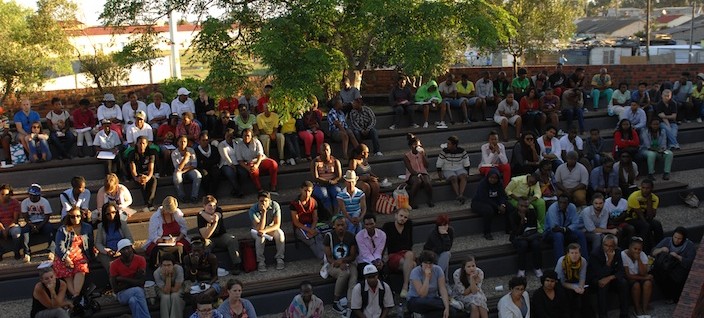Where is your pride?


It is not everyday that lesbian, gay, bisexual and transgender people from all over get together to talk about why they appear in the same space every year. And such is the power of the most celebrated march in South Africa, popularly known as the gay pride. Now called by many names, gay pride, gay march, pride parade or mardi gras, started in the streets of Johannesburg in 1990. Since then Cape Town, East London, Durban and Port Elizabeth have followed suit. The streets of Cape Town have been abuzz with all sorts of ‘gay’ people since 1993. In those initial years, the pride march was very much linked to a specific political agenda: human rights and justice.
Recently, lgbt people themselves have come to question the nature and relevance of the pride march. Many claim that over the years, it has become an apolitical celebration, sometimes completely detached from the realities of many lgbt people in South Africa. In response to this, Huma, the institute for humanities in Africa, under its public engagement programme, Cape Town Commons, hosted a discussion on the question of “Pride and Protest”. Attended by close to 150 people from many organisations linked to lgbt issues, panelists and the public were asked to ponder on the meaning of pride as well as the relevance of the pride marches in current day South Africa.
Sbusiso Kheswa from Gender DynamiX challenged the ways in which transgender people within the lgbt grouping do not find reasons to be proud or even be at the pride marches. As he stated, “the agenda for pride marches has always been about homosexuality” and that on its own has been “problematic”. Even though the space for pride marches has at once been political and focusing on justice, that space has only advanced gay and lesbian issues. The current challenges related to transgender people accessing identity documents or accessing hormonal therapy have never appeared in the political agendas of pride marches.
Reminding the crowd of the importance of the Constitution, Pierre de Vos from UCT Law brought into perspective some of the gains gay and lesbian people have fought for. The fight towards equality is about the right to be different from everybody else and to celebrate that difference. Most importantly, as de Vos argued “If pride is going to have any relevance, it should move back to being a celebration of difference but also a protest that difference is not recognized in society, especially if you’re not a white middle class man”.
The actual space of the pride march has become quite problematised in relation to its lack of diversity. Last year, a group of black women part of the One in Nine campaign took action against the Johannesburg Pride for “being depoliticised”. They argued that Jo’burg Pride did not take seriously some of the issues affecting black lesbians in the townships. In particular pride has become a commercial venture benefitting only a few. “The politics of resistance and change have taken a back seat, that pride is now just a party, a parade” stated Kwezi Mbandazayo of the One in Nine Campaign.
These challenges are not new and are symptomatic of what is happening in the country as a whole. Like many cities, Cape Town has contributed to staging the divisions and inequalities in South Africa. Vanessa Ludwig of the Gei Heis Collective argued, “we haven’t transformed South Africa. Gay and lesbian people have not been part of eradicating racial domination”. Many gay and lesbian people have and continue to be part of the system that maintains the “geographical apartheid that is in Cape Town today”. And so, the look of Cape Town or Johannesburg pride today does not exist in a vacuum.
What would the shifts in pride entail? We have to challenge all forms of inequalities and oppression that exist within our spaces, not only as lgbt people, but also as citizens of South Africa. It is our responsibility as citizens to be critical of the ways in which the differences we appreciate and recognize do not undermine another’s existence.
Township pride will take many of the issues that have disappeared from the pride agendas. The march on May 18th in Gugulethu will be to protest against hate crimes, health issues affecting lgbt people as well as violence, stated Pumeza Runeyi of the township pride committee. This date coincides with the international day against homophobia and transphobia.
Cape Town Pride ran from 16 February till 3 March, with the march on 2 March 2013 in de Waterkant Village. This year’s theme, according to organiser Luiz Delaja, was “stand up and be counted”.
By Zethu Matebeni
